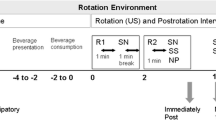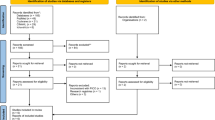Abstract
The delivery of cytotoxic drugs in cancer treatment is often accompanied by posttreatment side effects (e.g., nausea). Moreover, there is evidence that cancer patients are at risk to develop these side effects in anticipation of chemotherapy (i.e., anticipatory nausea [AN]). AN can be explained as the result of a classical conditioning process with the cytotoxic drug as the unconditioned stimulus (US). Stimuli paired with the US (e.g., smells, tastes) can become conditioned stimuli (CSs) eliciting AN as the conditioned response (CR). The present study was conducted to test whether AN shows characteristics of a CR. Fifty-five ambulatory cancer patients were asked to record nine kinds of physical symptoms (e.g., nausea, vomiting, sweating) on time-scheduled symptom lists: after an infusion (indicating posttreatment symptoms) and prior to their next infusion (indicating anticipatory symptoms). Each measurement period covered a maximum of 48 hours. AN was reported by ten patients (18.08%). Data revealed (a) a statistically significant association between posttreatment nausea and vomiting, respectively, and AN; (b) the occurrence of AN increased with drug emetogenity (i.e., US-intensity); and (c) the duration of AN increased with temporal proximity to the infusion. The results support the conditioning model. Thus, it is proposed to prevent AN by classical conditioning techniques (e.g., overshadowing).
Similar content being viewed by others
References
Bernstein, I.L. (1991). Aversion conditioning in response to cancer and cancer treatment.Clinical Psychology Review, 11, 185–191.
Bovbjerg, D.H., Redd, W.H., Maier, L.A., Holland, J.C., Lesko, L.M., Niedzwiecki, D., Rubin, S.C., & Hakes, T.B. (1990). Anticipatory immune suppression and nausea in women receiving cyclic chemotherapy for ovarian cancer.Journal of Consulting and Clinical Psychology, 58, 153–157.
Carey, M.P., & Burish, T.G. (1988). Etiology and treatment of the psychological side effects associated with cancer chemotherapy: A critical review and discussion.Psychological Bulletin, 104, 307–325.
Klosterhalfen, S., & Klosterhalfen, W. (1990). Conditioned cyclosporine effects but not conditioned taste aversion in immunized rats.Behavioral Neuroscience, 104, 716–724.
Siegel, S. (1989). Pharmacological conditioning and drug effects. In A.J. Goudie & M.W. Emmett-Oglesby (Eds.),Psychoactive drugs (pp. 115–180). Clifton, NJ: Humana Press.
Author information
Authors and Affiliations
Corresponding author
Rights and permissions
About this article
Cite this article
Stockhorst, U., Klosterhalfen, S., Klosterhalfen, W. et al. Anticipatory nausea in cancer patients receiving chemotherapy: Classical conditioning etiology and therapeutical implications. Integrative Physiological and Behavioral Science 28, 177–181 (1993). https://doi.org/10.1007/BF02691224
Issue Date:
DOI: https://doi.org/10.1007/BF02691224




